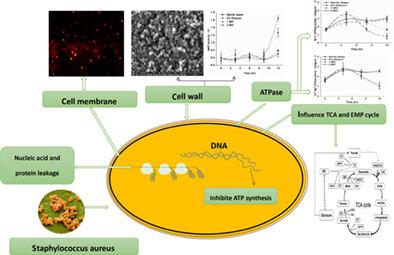当前位置:
X-MOL 学术
›
J. Food Saf.
›
论文详情
Our official English website, www.x-mol.net, welcomes your
feedback! (Note: you will need to create a separate account there.)
Antimicrobial activity and mechanism of limonene against Staphylococcus aureus
Journal of Food Safety ( IF 1.9 ) Pub Date : 2021-08-15 , DOI: 10.1111/jfs.12918 Yingjie Han 1 , Wenxue Chen 1 , Zhichang Sun 1
Journal of Food Safety ( IF 1.9 ) Pub Date : 2021-08-15 , DOI: 10.1111/jfs.12918 Yingjie Han 1 , Wenxue Chen 1 , Zhichang Sun 1
Affiliation

|
In this study, inhibitory effect of limonene on Staphylococcus aureus (S. aureus) and its antibacterial mechanism was explored, respectively. The results showed that limonene effectively inhibited bacterial growth at a minimum inhibitory concentration (MIC) of 20 ml/L. Scanning electron microscopy (SEM), the reduction of AKP activity and fluorescence microscope observation confirmed that limonene caused the destruction of the cell morphology and cell wall integrity of S. aureus. The reduction of MFI in fluorescein diacetate staining experiment and leakage of biological macromolecules (nucleic acids and proteins) indicated that limonene damaged the cell membrane and increased membrane permeability. Besides, the reduction of membrane potential (MP) further confirmed that the damage to membrane and the reduction of respiratory metabolic activity. Furthermore, the respiratory depression test confirmed that the pathway of limonene affecting the respiratory metabolism of S. aureus is TCA pathway, followed by EMP. In addition, the disorder of succinate dehydrogenase (SDH), malate dehydrogenase (MDH), pyruvate kinase (PK), ATPase (T-ATPase, Na+-K+-ATPase, Ca2+-Mg2+-ATPase), and ATP concentration demonstrated that limonene could result in a slowdown of metabolism and metabolic dysfunction, thus inhibiting ATP synthesis.
中文翻译:

柠檬烯对金黄色葡萄球菌的抗菌活性及作用机制
本研究分别探讨了柠檬烯对金黄色葡萄球菌(S. aureus)的抑制作用及其抗菌机制。结果表明,柠檬烯以 20 毫升/升的最低抑菌浓度 (MIC) 有效抑制细菌生长。扫描电镜(SEM)、AKP活性降低和荧光显微镜观察证实柠檬烯导致了金黄色葡萄球菌细胞形态和细胞壁完整性的破坏. 荧光素二乙酸酯染色实验中MFI的降低和生物大分子(核酸和蛋白质)的泄漏表明柠檬烯破坏了细胞膜并增加了膜通透性。此外,膜电位(MP)的降低进一步证实了膜的损伤和呼吸代谢活动的降低。此外,呼吸抑制试验证实柠檬烯影响金黄色葡萄球菌呼吸代谢的途径是TCA途径,其次是EMP。此外,琥珀酸脱氢酶(SDH)、苹果酸脱氢酶(MDH)、丙酮酸激酶(PK)、ATP酶(T-ATP酶、Na + -K + -ATPase、Ca 2+ -Mg 2+-ATPase) 和 ATP 浓度表明柠檬烯可能导致新陈代谢减慢和代谢功能障碍,从而抑制 ATP 合成。
更新日期:2021-10-08
中文翻译:

柠檬烯对金黄色葡萄球菌的抗菌活性及作用机制
本研究分别探讨了柠檬烯对金黄色葡萄球菌(S. aureus)的抑制作用及其抗菌机制。结果表明,柠檬烯以 20 毫升/升的最低抑菌浓度 (MIC) 有效抑制细菌生长。扫描电镜(SEM)、AKP活性降低和荧光显微镜观察证实柠檬烯导致了金黄色葡萄球菌细胞形态和细胞壁完整性的破坏. 荧光素二乙酸酯染色实验中MFI的降低和生物大分子(核酸和蛋白质)的泄漏表明柠檬烯破坏了细胞膜并增加了膜通透性。此外,膜电位(MP)的降低进一步证实了膜的损伤和呼吸代谢活动的降低。此外,呼吸抑制试验证实柠檬烯影响金黄色葡萄球菌呼吸代谢的途径是TCA途径,其次是EMP。此外,琥珀酸脱氢酶(SDH)、苹果酸脱氢酶(MDH)、丙酮酸激酶(PK)、ATP酶(T-ATP酶、Na + -K + -ATPase、Ca 2+ -Mg 2+-ATPase) 和 ATP 浓度表明柠檬烯可能导致新陈代谢减慢和代谢功能障碍,从而抑制 ATP 合成。









































 京公网安备 11010802027423号
京公网安备 11010802027423号